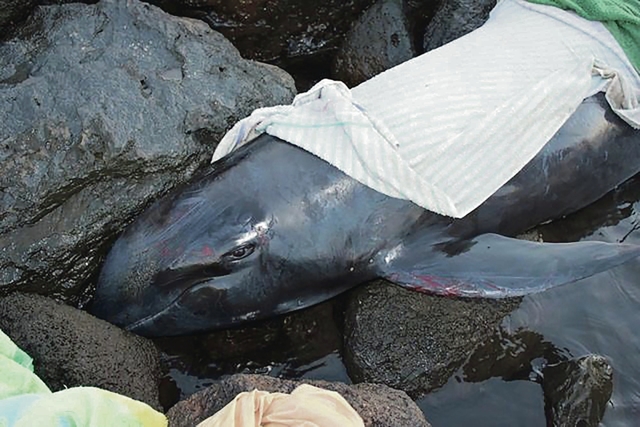Were they interfering with the rescue of a stranded whale or not?
That is the question left to a federal judge following an administrative hearing last week to determine whether two Hilo women who run a small Native Hawaiian group dedicated to the protection of whales and other marine animals will be punished for violating the Marine Mammal Protection Act.
Kealoha Pisciotta and Roxane Stewart of Hilo-based Kai Palaoa face fines of up to $27,000 in connection with the June 2014 incident at Kawaihae on Hawaii island.
But they contend they were merely following traditional Native Hawaiian cultural practice as they tried to save and comfort a dying melon-headed whale before returning its remains to the ocean.
The three-day hearing, featuring a handful of witnesses at the West Hawaii Community Center in Kona, was held last week after mediation failed to resolve the question earlier in the year.
The women said they were hoping the mediation process would help the National Oceanic and Atmospheric Administration realize its obligation under the law to allow for greater latitude in allowing Native Hawaiian traditional cultural practices.
NOAA official Jeff Walters said he couldn’t comment on the specifics of the case. But he added that NOAA has gone out of its way to accommodate Native Hawaiian practitioners within the boundaries of law and public safety, having successfully worked with them dozens of times in strandings over the years.
But this time it didn’t work out, Walters said.
The violations, described as an “illegal take and transport,” occurred June 10-11, 2014, after Pisciotta and Stewart were asked by West Hawaii cultural practitioners to help respond to a stranded melon-headed whale at Kawaihae.
The melon-headed whale, a dolphin-size relative of the pygmy killer whale and pilot whale, is a common species found in tropical and subtropical oceans around the world but is rarely seen because it lives in deep water far from shore.
Pisciotta said the sick whale was barely alive when they arrived at Kawaihae. As the hours passed and it appeared nothing would help to revive the animal, everyone had left except Pisciotta and Stewart, who stayed with the animal they called Wananalua until it died early in the morning.
Neither NOAA nor its representatives remained on the scene to provide guidance on how to treat the animal, Pisciotta said, so they followed their own Hawaiian traditions, guarding the small marine mammal in the sheltered waters of Kawaihae Harbor through the night before transporting it offshore the next morning to conduct a burial ritual.
Walters, NOAA’s Pacific office Wildlife Management and Conservation Branch chief, said the agency dispatched a team to respond to the stranding, but it was unable to do its job.
Kai Palaoa is composed of Native Hawaiian cultural practitioners who “stand and take to heart our kuleana (responsibility) in caring for our distressed kanaloa (marine mammals). They are important in maintaining the natural balance and survival of our oceans,” according to the group’s website.
Pisciotta, founder of Kai Palaoa, is also president of Mauna Kea Anaina Hou and lead litigant in the Mauna Kea Hui lawsuit against the Thirty Meter Telescope.
As members of NOAA’s Hilo Marine Mammal Stranding Network, Pisciotta and Stewart have undergone training on rescue and disentanglement and have joined previous stranding responses. They have also helped to train volunteers on cultural practices.
Pisciotta said NOAA has argued that the women were “confrontational” at the scene, preventing the carcass from being retrieved for a necropsy. But that was not the case, she said.
According to the NOAA Fisheries Pacific Islands Regional Office website, “It is important that the remains of a dead marine mammal are untouched as there may be an ongoing investigation to determine the cause of death.”
According to the Marine Mammal Protection Act, a “take” means to “capture, maim, injure or kill” any marine mammal or attempt to do so. The unauthorized transporting of a marine mammal is also illegal.
“We invite participation by cultural practitioners to help us be culturally respectful to the individual animal and to the community where the stranding occurs,” NOAA spokeswoman Jolene Lau said in an email. “Our goal is to continue this effort, while remaining compliant with the Federal Marine Mammal Protection Act and Endangered Species Act.”
But traditional Hawaiian practice calls for returning the revered animal to the sea, Pisciotta said.
Pisciotta and Stewart have argued that the federal agency has an obligation to protect and uphold the traditional and customary rights of Native Hawaiians under the state’s Admission Act.
In so doing, NOAA should allow greater latitude for Native Hawaiian cultural practices, much as it does in Alaska, where natives are allowed to hunt and kill whales.

